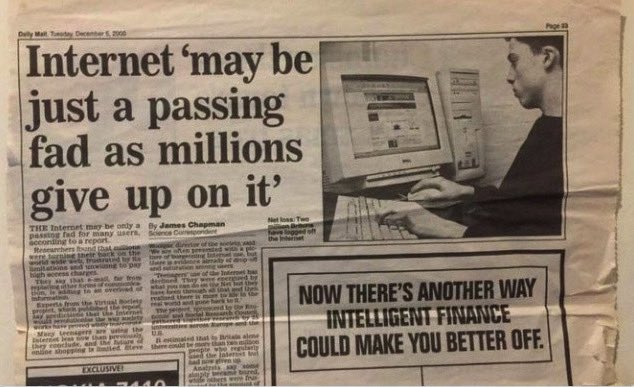We’re about to have a renaissance in enterprise software and IT. Every CIO I’ve chatted with in the past couple months is embarking on significant digital transformation right now. Last year the dam broke, and now it’s a tidal wave.
One of the coolest things to see as you scale is when teams spend an inordinate amount of time on the *seemingly* small things. The big decisions are important and very fun, but it’s the 1,000’s of little details that compound over time that make or break you.
Visa is about to enable bitcoin purchases. This is great news, now we all can purchase pizzas with bitcoin that eventually would have been worth millions of dollars in ten years.
Now that offices are slowly starting to open back up, defining this new digital-first way of working anywhere is profoundly more interesting and complicated than when everything was fully remote. We’re in for a wild year!
Most companies won’t return fully to the office. And most companies won’t remain fully remote. Software will bridge these worlds to make work and information sharing seamless. Lots of work to do make this simple, if not magical.
Subsidized child care and elder care, improved minimum wage, more investment in education and workforce development, internet for everyone — these will all be boons for our economy over the near and long run.
Incredible to think that chips are still getting way faster. Internet is getting faster. Computing is getting cheaper. Data is growing exponentially. Which means every interesting problem we’re solving today with software will be a step function better in the future.
Staying focused and taking a long term view almost always compounds over time. Box at $800M run-rate has a bigger opportunity and more exciting roadmap ahead than at any other point in our history. Now, lots of work to do!
An NFT just sold for $69 million dollars. This will serve as confirmation that we are in fact in a simulation. cnb.cx/30zlUA4
I’m confident that quantum mechanics is far easier to understand than trying to figure out how teams will manage their schedules in a hybrid workplace.
The age old question of do you want to take a small piece of a big market or a big piece of a small market is a strategic trap. You want a piece of a market that is artificially small now and will become big later with the right product.
The best part of building software is the job is never done. Since starting Box, I don’t think I’ve ever left a customer conversation where this isn’t something new left to go do. Build the future, listen to your customers, repeat.
Incredibly, the 4 largest tech companies in the world are all growing at unprecedented rates for their scale, and for entirely different reasons (ads, subscriptions, devices, commerce). Multiple paths for success.
Digital money. Smart contracts. Transformed supply chains. Distributed computing. All the biggest ideas in the world, and yet it’s going to be crypto basketball trading cards that makes the blockchain mainstream. 😀
Working fully in-office is well understood. Working fully remotely is well understood. We will need a new set of workplace norms, tools, and processes for the hybrid, flexible workplace. This is a massive opportunity for enterprise software innovation to stitch this all together.
No biggie that modern science just launched a thing into the sky that traveled for 7 months and landed on Mars and is going to test for when it’s safe for us to all move there.
Prince Harry now works at a tech startup. Shout out to all the internal recruiters having to respond to emails from their founders asking about other available royalty.
Two strategies to grow as a startup: take from the existing addressable market, or expand the addressable market. When you do the latter, the former comes along for free.
The lesson always is: focus on expanding the market, not taking the market. twitter.com/alexeheath/sta…
We have reached the point of the internet where we are now bundling the things that we unbundled from the things that used to be bundled.
When we launched Box in ‘05, we bet on 4 megatrends that would shift the power to cloud vs. legacy software: faster internet, cheaper compute and storage, mobile, and better browsers. Even so, underestimated the scale of each tailwind. Always bet on the megatrends.
Snapchat is now worth $100B. Everyone thought Facebook would crush them when they turned down a $3B offer. Staying focused and ignoring the doubters is how you continue to compound value over the long run.
20 years ago. pic.twitter.com/xWlayv9wHE
